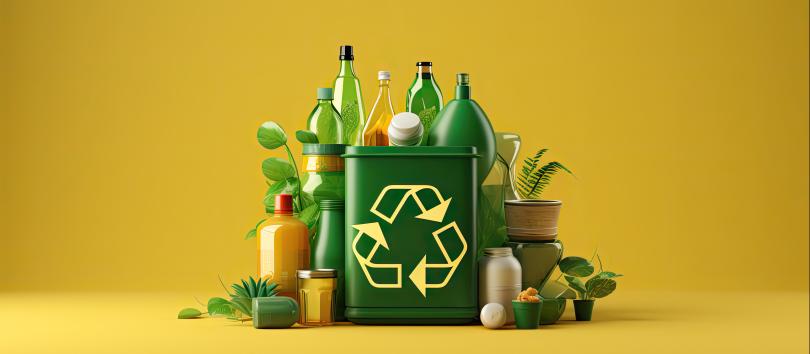
Starting small, but dreaming big: community action to recycle plastic waste in Tbilisi
Ia Imerlishvili is a woman on a mission. Having grown up in what she describes as one of the beautiful cities, Telavi, in Georgia’s eastern province of Kakheti, after moving to Tbilisi she was disturbed by the lack of care shown to communal areas of the apartment block she and her family live in.
“Living in a shared building is different from the life I had in Telavi,” she says. “Whether it is the entrance or the roof, it is common property here. That is why it is important to be involved, united and to care for our environment.”
Distressed by what she saw as a lack of a joint approach over issues that included the care and cleanliness of communal areas, she resolved to take action.
“There were various cases – a water pipe bursting, problems with night lighting and delays in [repairs] for the entrance hall and stairs. I saw that we did not have a joint approach to these and other issues – for example, the same residents took care of cleaning the common areas.”
Having grown up with environmentally aware parents – her mother teaches biology in a public school and, through an “Eco Club”, takes care of raising environmental awareness among schoolchildren, – Ia resolved to address the lack of a waste management system in her nine-storey apartment block.
“A few years ago, I took an Environmental Manager certification course. Although I did not continue my career in this profession, I constantly try to use the knowledge I acquired in my daily and professional activities,” Ia says.
In her apartment block, she started with small steps, separating plastic and other recyclable waste at home – mainly paper – before being joined by a neighbour, Nona. “We used to take the waste we collected to be recycled, driving there in my car.”
But it was what she did next that brought her project to the attention of the European Training Foundation’s Green Skills Award 2023: she discovered that a recycling company was offering private and state entities a service to collect and recycle polyethylene waste – plastic bottles and packaging. When she contacted the company, managers there were surprised to be hearing from the resident of an apartment block, but agreed to allocate waste collection boxes for her group of 27 flats and their families.
“Every week this company comes and takes the waste me and my neighbours collect to be recycled for secondary use,” she says.
Now it is approaching a year since the plastic waste collection boxes were first delivered, and Ia estimates that with 10 kilograms of waste bottles and plastic collected each week, she and her neighbours have saved around 500 kilograms of non-biodegradable waste from ending up in a landfill in a year.
“I posted the announcements in our communal areas, and also the meaning of this project. I asked the neighbours to unite in a common cause. And although not all of them had a similar experience, 27 families are already sorting their waste.”
Although her project was not among the top 10 finalists in the ETF's 2023 Green Skills Award, it demonstrates how meaningful green and environmental projects can be launched from the simplest of actions. Ia now has plans to widen the scope of her initiative, noting that residents of neighbouring entrances in her apartment block have started bringing their recyclable waste to the boxes too.
“I think it's time to put boxes in their entrances too,” Ia says. “I really want to do a small event for our neighbours, where I will introduce the results of the first year and set new goals together. This will give motivation to others and we will unite in doing very good work.”
Ia is also planning to lobby local authorities to present the results of her community’s actions and to see if they bring influence to spread the idea and practice.
Most of the waste is PET bottles, household waste, shampoo, disposable containers, egg containers. And that is from just a couple of dozen families living in flats with one common entrance in an apartment block in Georgia’s most populous city.
“Waste separation reduces the landfill problem, employs people and creates jobs. Recyclable waste should not end up in a landfill. Recycling is a raw material for production and it also reduces production costs at the same time,” Ia concludes.
Did you like this article? If you would like to be notified when new content like this is published, subscribe to receive our email alerts.